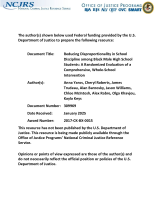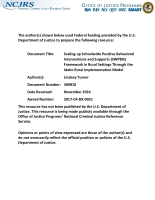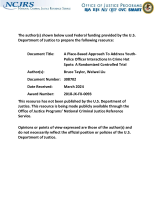Intervention
Technology-Enabled Intervention to Enhance Mindfulness, Safety, and Health Promotion Among Corrections Professionals: Protocol for a Prospective Quasi-Experimental Trial
Third-Party Policing: A Randomized Field Trial to Assess Drug Crime Reduction and Police-Hotel Partnerships
Evaluating a Cognitive Behavioral Approach for Improving Life Outcomes of Underserved Young Women: A Randomized Experiment in Chicago
The Impact of a Brief and Immersive Use-of-force Training Exercise on Citizens' Attitudes Toward Police
Evaluability Assessment and Development of Psychological-Behavioral Approaches to Prevent Terrorism and Facilitate Reintegration of Violent Extremists
An Evaluation of a Statewide Approach to the Prevention and Intervention of Violence Using School Threat Assessment Teams
Substance Abuse Intervention Division (SAID): New York City Department of Corrections' Drug Treatment Program for Women Offenders
Intervention Development of the Resiliency in Stressful Events (RISE) Curriculum: A Trauma-Informed Reentry Approach for Men
Studies of Mistreatment of Older Adults Offer Solutions to an Urgent and Growing Societal Problem
Reducing Disproportionality in School Discipline among Black Male High School Students: A Randomized Evaluation of a Comprehensive, Whole-School Intervention
Identifying and Treating Overdose Hotspots: A Randomized Controlled Trial of Place-Based Harm Reduction Strategies
Scaling up Schoolwide Positive Behavioral Interventions and Supports (SWPBIS) Framework in Rural Settings Through the Idaho Rural Implementation Model
"Philadelphia Focused Deterrence Findings from the Impact Evaluation"
Heal Our Youth: A Mixed Methods, Hybrid Effectiveness Implementation Trial for Reducing Community Violence Among Youth in Limited-Opportunity Settings
Quasi-experimental evaluation of contraband interdiction technologies
The Development of a Peer Advocacy Intervention for Survivors whose Partners are in Relationship Violence Intervention Programs.
A Multi-District Analysis of School Safety in School Districts Awarded STOP School Violence Grants in Fiscal Years 2018–2023
Improving police-public relationships through intergroup contact: A mixed-methods evaluation of the Voices communication intervention
Evaluating the Effectiveness of a Fatigue Training Intervention for the Seattle Police Department: Results from a Randomized Control Trial
A Bayesian Analysis of a Cognitive-Behavioral Therapy Intervention for High-Risk People on Probation
Webinar Transcript: NIJ FY 2024 Research and Evaluation on Youth Justice Topics
This webinar will provide an overview of the NIJ FY 2024 Research and Evaluation on Youth Justice Topics solicitation. In collaboration with the Office of Juvenile Justice and Delinquency Prevention, NIJ seeks applications for research and evaluation projects that inform policy and practice in the field of...






